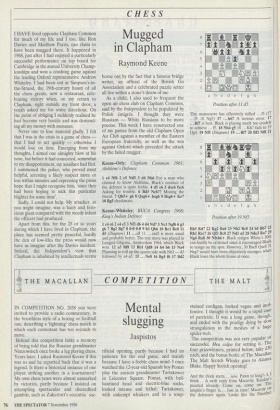CHESS
Mugged in Clapham
Raymond Keene
I HAVE lived opposite Clapham Common for much of my life and I too, like Ron Davies and Matthew Parris, can claim to have been mugged there. It happened in 1968, just after I had enjoyed a particularly successful performance on top board for Cambridge in the annual University Champ- ionships and won a crushing game against the leading Oxford representative Andrew Whiteley. I had been out at Simpson's-in- the-Strand, the 19th-century haunt of all the chess greats, now a restaurant, cele- brating victory when, on my return to Clapham, right outside my front door, a youth asked me for some directions. On the point of obliging I suddenly realised he had become very hostile and was demand- ing all my money with menaces.
Never one to lose material gladly, I felt that I was in the crisis in a game of chess — that I had to act quickly — otherwise I would lose on time. Emerging from my thoughts, I aimed one almighty blow at his nose, but before it had connected, somewhat to my disappointment, my assailant had fled. I summoned the police, who proved most helpful, arresting a likely suspect more or less within minutes and expressing the pious hope that I might recognise him, 'since they had been hoping to nick this particular blighter for some time'.
Sadly, I could not help. My attacker, as you might imagine, was a hairy and fero- cious giant compared with the weedy infant the officers had produced.
Apart from this, for the 25 or so years during which I have lived in Clapham, the place has seemed pretty peaceful, hardly the den of low-lifes the press would now have us imagine after the Davies incident. Indeed, the Independent's view that Clapham is inhabited by intellectuals seems borne out by the fact that a famous bridge writer, an official of the British Go Association and a celebrated puzzle setter all live within a stone's throw of me.
As a child, I also used to frequent the open air chess club on Clapham Common, said by the Independent to be populated by Polish emigres. I thought they were Russians — White Russians to be more precise. This week I have resurrected one of my games from the old Clapham Open Air Club against a member of the Eastern European fraternity, as well as the win against Oxford which preceded the attack by the failed mugger.
Keene–Orly; Clapham Common 1961; Alekhine's Defence
1 e4 Nf6 2 e5 Nd5 3 d4 Nb6 For a man who claimed to know Alekhine, Black's conduct of the defence is quite feeble. 4 d5 e6 5 dxe6 fxe6 Asking for trouble. 6 Bd3 Nc6?? Missing the threat. 7 Qh5+ g6 8 Qxg6+ hxg6 9 Bxg6+ Ke7 10 Bg5 checkmate.
Keene–Whiteley; BUCA Congress 1968; King's Indian Defence
1 c4 c6 2 e4 e5 3 Nf3 d6 4 d4 Nd7 5 Nc3 Ngf6 6 g3 g6 7 Bg2 Bg7 8 0-0 0-0 9 h3 Qb6 10 Rel Re8 11
d5 (Diagram) 11 c5 11 ... cxd5 is more usual and probably better. The text move was played in Lengyel-Gligoric, Amsterdam 1964, which Black won. 12 a3 Rf8 13 Rbl Qd8 14 b4 b6 15 Na4 Planning to roll up the queen side with Nb2 — d3 followed by a4-a5. 15 ... Ne8 16 Bg5 f6 17 Bd2 Position after 11 d5
This manoeuvre has effectively stifled ... f5 (17
f5 18 Ng5) 17 ... h6? A serious error. 17 ...Rf7 is best. Black is playing much too crudely to achieve ... f5. 18 Nh4 g5 18 ...Kh7 fails to 19 Qg4. 19 Nf5 (Diagram) 19 ... Rf7 20 Bf3 Nf8 21 Position after 19 Nf5 Bh5 Rd7 22 Kg2 Ba6 23 Nb2 Rc8 24 b5 Bb7 25 Rh! Rcc7 26 Qf3 Bc8 27 Ndl a5 28 Nde3 Ra7 29 Ng4 Ra8 30 Nikh6+ Black resigns White's 30th can hardly be criticised since it encouraged Black to resign on the spot. However, 30 Bxe8 Qxe8 31 Nxg7 would have,been objectively stronger, when Black loses the whole house at once.


















































































 Previous page
Previous page